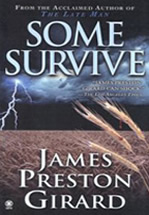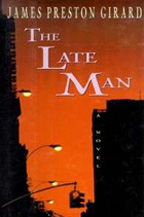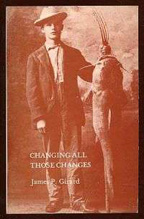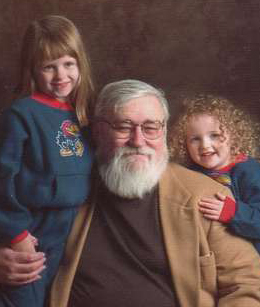



|
| Biography |
|
| |
James Preston Girard was born in Oregon in 1944 while his father was stationed at the U.S. naval base in Tillamook. When he was less than a year old, his father was killed, and his mother moved the family back to Kansas. Girard's family moved in with his grandparents in Longton, Kansas, where both his parents had grown up. His mother eventually found a job at Boeing in Wichita, Kansas, and moved the family there.
Girard lived in Wichita until graduating from East High in 1962, despite a brief period in Corpus Christi, Texas. He enrolled at Kansas University in Lawrence, Kansas, where he planned to major in Linguistics.
Girard began writing seriously as an undergraduate at KU, first poetry and then fiction. His ability to write and the flattery from those around him, including his future wife, whom he met while at KU, led him to change his major to creative writing.
After graduating from KU, Girard was accepted to the John Hopkins graduate writing program. Their program consisted of writing for one year and then the awarding of an MA.
Visit James Preston Girard at his official webpage
www.thelateman.com
Return to Top of Page |
|
|
Bibliography ( - housed in Thomas Fox Averill Kansas Studies Collection) - housed in Thomas Fox Averill Kansas Studies Collection) |
|
| |
 Some Survive (Onyx, 2002) Some Survive (Onyx, 2002)- Letzte Meldungen (German, Droemer Knaur, 1995)
 The Late Man (Athenium, 1993) The Late Man (Athenium, 1993)
 A Killing in Kansas (Fawcett, 1991) *under pseudonym Jeffrey Tharp A Killing in Kansas (Fawcett, 1991) *under pseudonym Jeffrey Tharp
 Kansas Stories 1989 (Woodley Memorial Press, 1989) *introduction and edited by James Preston Girard Kansas Stories 1989 (Woodley Memorial Press, 1989) *introduction and edited by James Preston Girard
 Changing All Those Changes (Yardbird Publishing Company, 1976) Changing All Those Changes (Yardbird Publishing Company, 1976) Return to Top of Page
|
|
|
| Writing Sample |
|
| |
A Killing in Kansas
Outside the office, it seemed darker in the basement than it had before I realized that that was because someone had closed the door at the top. The someone was standing just inside the closed door, pointing a gun at me. He flicked on the light. He was a tall, thin man with a narrow, bloodless face. Beside him was a sweet little roly-poly woman of about fifty with silver-white hair.
"Church out already?" I asked.
"See if he's got a gun," the woman said. Her voice didn't sound sweet.
Return to Top of Page
|
|
|
Author Interview |
|
| |
Q: What about your family history influenced your writing?
A: My stepfather was an abusive alcoholic and I was the principal target of his abuse. He finally left for good on the night before I began 7th grade in 1957, and it was as if I had gone to sleep while in Kindergarten and reawakened in junior high. I had been completely focused on my stepfather during those years -- finding ways to hide, paying close attention to try to predict his moods, and so on. Although this was a very unpleasant time, I think that, in some ways, it was good preparation for writing fiction. When I "awakened" and began to engage in the world, I had not been properly socialized and it seemed to me that the people around me took for granted things that seemed obvious nonsense to me, or that were at least unsupported by experience. My lack of socialization, along with my tendency to want to hide -- to be invisible, as my wife likes to say -- and to pay close attention to everything going on around me marginalized me, making me more of an observer than a participant. This was something that turned out to be very useful in the time I later spent working as a journalist in Topeka and Wichita.
I had also learned to live on very little and not to want things that I couldn't have. My stepfather had sometimes been gone for a few weeks, usually after being fired for drinking on the job, and those times were the happiest of my childhood, despite the fact that during those times we had virtually no money. I can still live quite happily on very little, and I live being poor because people leave you alone because you have nothing they want. This is also something that is helpful to a fiction writer. As you may know, only about 5% of all published writers make enough to live on.
One day when I was a freshman in college I got a phone call from my grandfather telling me that my mother and sister had disappeared. I think that my mother's departure solidified my feeling of being completely on my own, a situation that I was very content with, feeling safe for the first time in my life. In retrospect, I realize that my undergraduate years, when I felt myself to be completely alone, were the happiest time in my life. I was during that time in my life that I began to write seriously -- first poetry and then fiction. By the time I was a senior I had become pretty much established as a writer.
Return to Top of Page
|
|
|
| Book Reviews |
|
| |
Some Survive
"The story is full of mystery, discovery,and of suspense and twists, keeping the reader in doubt about the course of the story. The author has fully explored the relationships of characters to each other and to their environment."
--- Barbara Buhrer, Reviewing the Evidence
"A very accomplished piece of work. What a crime novel should be."
--- Ruth Rendel
"Mesmerizing [and] powerful."
--- The New York Times Book Review
"The year's best."
--- The Los Angeles Times Book Review
The Late Man
"A mesmerizing novel. Without doing anything especially groundbreaking, except writing very well and with unusual depth and feeling, Mr. Girard verifies the amazing flexibility of the genre by creating... psychologically rich characters... and elevating a sordid crime story into a powerful existential drama."
--- New York Times Book Review
"North of Wichita, Kansas, an ordinary field sits beside a narrow dirt road. An unknown, and perhaps unidentifiable, body lies there, the apparent victim - and the first in several years - of a local serial murderer. In James Preston Girard's deceptively spare yet thoroughly harrowing novel, this ugly death will draw to it three intriguing and sympathetic characters, each determined - and, we come to feel, fated - to resolve this brutal mystery. They are L. J. Loomis, a resourceful and honest detective whose life has already been soured by his pursuit of the unknown killer; Stosh Babicki, an earnest young reporter trapped in a relationship that threatens her own integrity; and the title character, Sam Haun, the night-desk man on the local paper, a man beset by grief and memory. What begins for them as an exercise of solemn procedure and by-the-book detection is transformed into a totally disorienting tale of uncertainty and fear, in which no fact and no one - whether in the glare of day on the Great Plains or the shadows of midnight - can be relied on or trusted. Already hailed by his fellow writers, James Preston Girard's The Late Man is a stunningly original and unnerving novel of suspense."
--- Good Reads Review
"An assured, literate writer, Girard has written a suspense novel that explores human relationships as well as the crime that brings them into focus. A Kansas college student is found murdered; the m.o. is the same as that of a known serial killer, but the police can't rule out a copycat. This grisly but conventional opening leads to a story of psychological complexity. Three people become obsessed with finding the killer: workaholic Capt. L. J. Loomis, a police detective whose ex-wife is about to move in with her sociology professor boyfriend; Sam Haun, a reporter whose wife and daughter died in a car crash; and wide-eyed young reporter Stosh Babicki. Haun learns that his dead wife was having an affair with Frank Rule, the same man who is now involved with Stosh. Haun's obsession with taking revenge on Rule nearly derails him, just as the web of deceptions and evasions among the three principals nearly derails the murder investigation. Though it lacks the suspense of a traditional thriller, this psychologically penetrating and often haunting novel carries the extra dimension of the author's empathy for his characters."
--- Lee Goerner, Fiction Review
Return to Top of Page |
|
|
|





